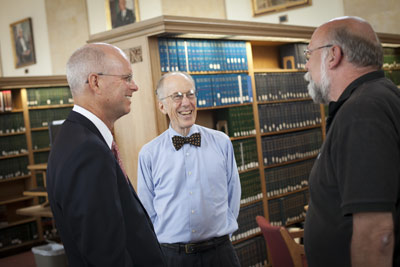Legal Information Institute celebrates 20 years of open access to law

In Internet time, 20 years is an eternity. So when Cornell Law School's Legal Information Institute celebrates its 20th anniversary this year, it is no ordinary milestone.
Back in 1992 -- long before smartphones, iPads, Web 2.0 and Google -- a law professor and an information technologist at Cornell Law School built the Internet's first legal website, the Legal Information Institute (LII), to publish the laws that govern us and make them freely available to everyone on the new World Wide Web. Among the first 30 websites in the world, the LII continues to provide a place where lawyers and business leaders, government regulators and ordinary citizens can access the law without cost.
"While the LII might be the best-kept secret on Cornell's campus, 65 percent of hits to the Cornell University website are for the LII," says Stewart Schwab, the Allan R. Tessler Dean and professor of law. "It's certainly no secret to the 14 million people who visit each year. Twenty years ago, no university had the distinctive expertise of both law and technology required to build it, and only a handful of universities could replicate it today."
LII by the numbers
• 14 million visitors per year use the site
• 65 percent of all Cornell Web traffic is to LII
• 650,000 pages of legal information are live on the site
• 225 countries send visitors to the website
• 90 million LII Web pages were viewed last year
• 15.3 million Web pages link to the LII
• 37,000 people read the LII Supreme Court Bulletin, either via email or in Federal Lawyer magazine
• 8 full-time staff keep the LII running
• 400 Cornell law students have served on the LII Bulletin
What most legal professionals simply call "the Cornell site" continues to play a leading role in the creation of new software technologies that make laws accessible, LII Director Thomas R. Bruce says: "It's a unique institutional fit. We get enormous benefit from our location in a world-class law school that is part of a world-class university. We can draw on tremendous expertise, and what we see around us every day renews our commitment to our mission."
The LII has provided expertise to anyone who supports open access to law -- from the U.S. House of Representatives to the Library of Congress, from commercial publishers in the United States to fledgling law schools in Vietnam.
When Bruce and Peter W. Martin, the Jane M.G. Foster Professor of Law Emeritus and former dean of the Law School, co-founded the LII in 1992, they could not have envisioned what would happen next.
In 2002, 10 years after the LII website launched, delegates from more than a dozen countries assembled at the Law Via the Internet (LVI) conference to craft the Declaration on Free Access to Law. This document served as the foundation upon which future LII's would be built and has forever aligned the LII name to what has become a worldwide movement. Today, you can find LII namesakes in England and Australia, Uganda and Lesotho, Thailand and Japan -- more than 40 countries in all. And with Cornell's help, the list continues to grow.
Cornell Law School will welcome many of these LIIs to the United States for the first time at this year's LVI conference Oct. 7, 8 and 9. This event will gather nearly 300 of the world's leading advocates of open legal access from such disciplines as open access publishing, government policy, application development and legal informatics.
The conference will feature keynote addresses by legal technology innovator Richard Susskind and social media visionary Clay Shirky. Headline speakers include GovLoop.com founder Steve Ressler, legal information analyst David Curle, United Nations project on Information Technology in Legislatures head Gherardo Casini, GovTrack.us founder Joshua Tauberer, and Google Scholar founding engineer Anurag Acharya. In all, more than 75 speakers from 25 countries will deliver presentations that encompass all aspects of legal information technology and the free-access-to-law movement. The LII's 20-year milestone will be commemorated at a gala dinner in Barton Hall.
Media Contact
Get Cornell news delivered right to your inbox.
Subscribe